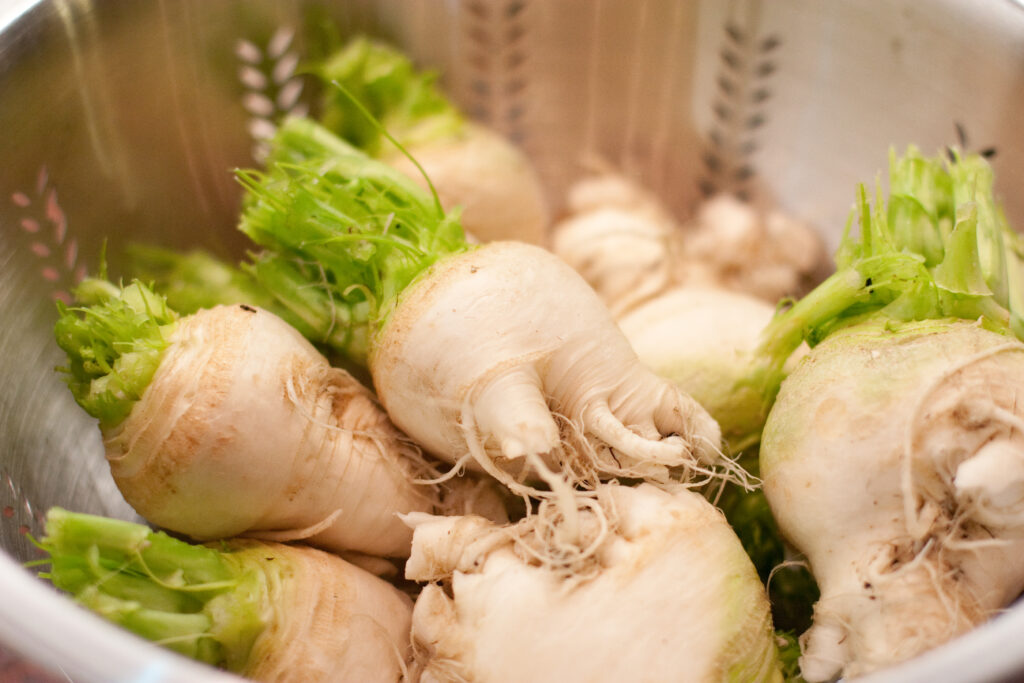Root Vegetables: Nature’s Underground Wonders

Root vegetables are one of nature’s underground wonders, loaded with essential nutrients, fiber, and antioxidants that offer numerous health benefits. These highly underrated vegetables play a role in preventing cardiovascular disease, regulating blood sugar, preventing cancer and ulcers, and supporting the immune system. Except for white potatoes, most root vegetables have a low or moderate glycemic index, making them good choices for diabetic, weight loss, and gluten-free diets.
An excellent source of dietary fiber, root vegetables contribute to digestive health. One baked sweet potato with the skin provides 4 grams, while 1 cup of beets provides 3.8 grams of fiber. Root vegetables contain soluble and insoluble fiber, which help create bulk and softness in bowel movements. By promoting regular bowel movements, fiber prevents constipation and keeps you feeling full for extended periods. In addition, root vegetables contain other compounds that act as prebiotics. Prebiotics support a healthy microbiome in the intestine, fostering a healthy immune system.
Root vegetables are rich in antioxidants, including carotenoids and anthocyanins. Carotenoids, like beta-carotene in carrots and sweet potatoes, help improve eye health and boost the immune system. Anthocyanins in purple sweet potato, blue potato, and beets help reduce inflammation and promote heart health. Antioxidants also boost species of good bacteria in the microbiome. Interestingly, exercise increases antioxidant levels in our heart, liver, and skeletal muscle and boosts the antioxidant defense system throughout the body.

Other compounds found in root vegetables, like diosgenin in yams, have been found to lower total cholesterol by increasing bile acid production and reducing cholesterol reabsorption. Bile acids are made from cholesterol in the liver and reabsorbed in the intestines. By interrupting this process, yams can reduce cholesterol levels. In a rat study, researchers also found diosgenin to protect the liver from a high-cholesterol diet and protect cells from polyunsaturated fats’ oxidation.
Coumarins are another compound found in parsnips, beets, and carrots that reduce smooth muscle spasms in the intestine and prevent the growth of breast, colon, lung, and prostate cancer.
Root vegetables are a great source of essential vitamins and minerals. They are high in vitamins A, C, and K. Vitamin A is necessary for eye health, immune function, and cell growth. Vitamin C boosts the immune system, aids collagen production, and acts as an antioxidant. Vitamin K plays a critical role in blood clotting and maintaining bone health.
Furthermore, root vegetables are rich in minerals like potassium, magnesium, and folate. Potassium is essential for maintaining healthy blood pressure and muscle and nerve function. At the same time, folate is critical for DNA synthesis and red blood cell production. Magnesium plays a vital role in over 300 biochemical reactions in the body, including utilization of Vitamin D. According to the Linus Pauling Institute, as many as 52.2% of adults do not meet the daily requirement for magnesium.
Root vegetables to try:
• Rutabaga, a member of the broccoli family
• Beets, red, white, and striped
• Carrots, orange, white, blue
• Potatoes, red and blue are best
• Sweet potatoes
• Yams
• Turnips
• Parsnips
• Radishes, daikon
• Fennel
• Celeriac
• Jicama
Incredibly versatile in the kitchen, you can enjoy them raw, roasted, boiled, mashed, or pureed. From soups and stews to salads and side dishes, there are countless ways to incorporate root vegetables into your meals and boost your nutrition.

Linda Illingworth, RDN, CSSD, is the Registered Dietitian at Lifewellness Institute, a medical practice specializing in wellness, where she provides clinical care and nutritional guidance for patients and corporate clients. An expert in functional nutrition, Linda is known for her practical advice to find the best nutritional path to achieve specific health goals. As a certified specialist in Sports Nutrition, Linda also has specialized training in food sensitivities, supplementation, wellness, thyroid and cardiovascular nutrition. Linda holds a B.S. in Nutrition from California State University Long Beach and completed her dietetic internship at St. Luke’s Hospital, Wisconsin. Her special interest in nutrition and wellness began in college with her father’s death, the result of cardiovascular disease and thus created a life-long desire to learn. Linda is frequently consulted for her depth and breadth of nutritional knowledge, has developed nutrition curriculum for popular destination health spas, National University, consults for non-profit nutrition programs, and can be found in print and online media.
References:
Simioni C, Zauli G, Martelli AM, et al. Oxidative stress: role of physical exercise and antioxidant nutraceuticals in adulthood and aging. Oncotarget. 2018;9(24):17181-17198. Published 2018 Mar 30. doi:10.18632/oncotarget.24729
Kenari HM, Kordafshari G, Moghimi M, Eghbalian F, TaherKhani D. Review of Pharmacological Properties and Chemical Constituents of Pastinaca sativa. J Pharmacopuncture. 2021;24(1):14-23. doi:10.3831/KPI.2021.24.1.14


